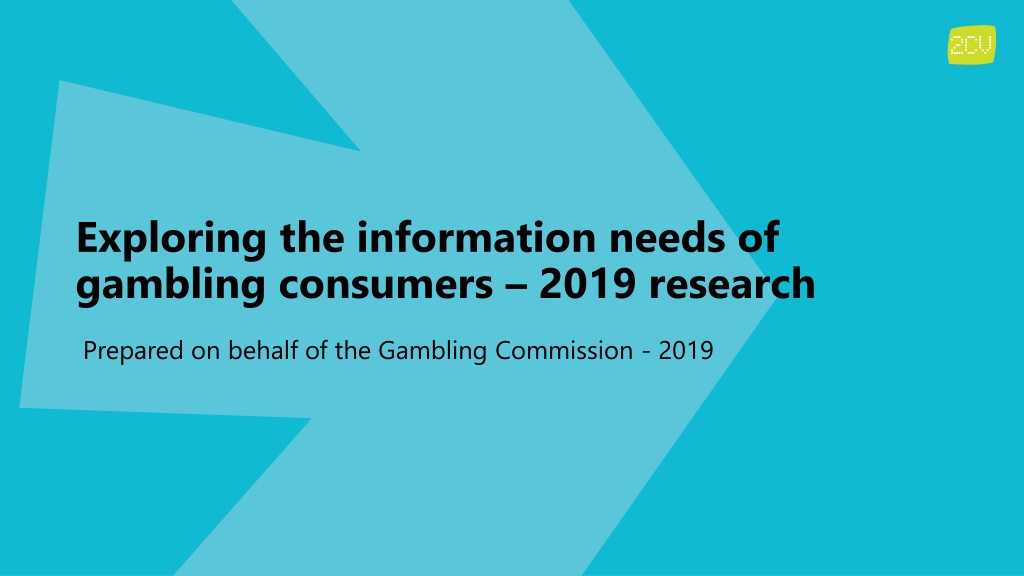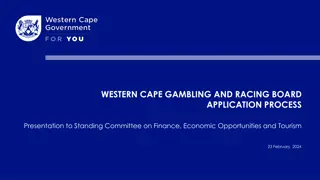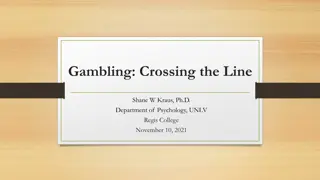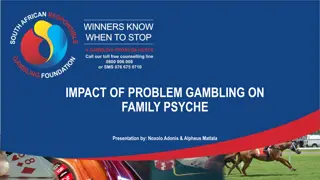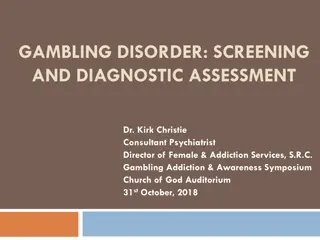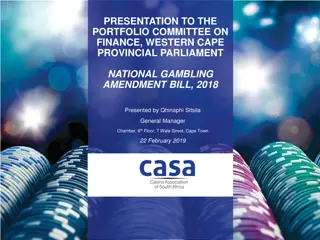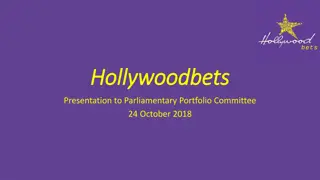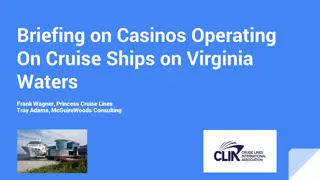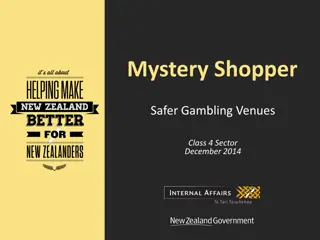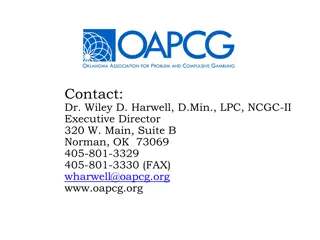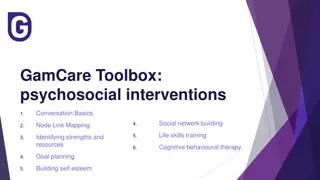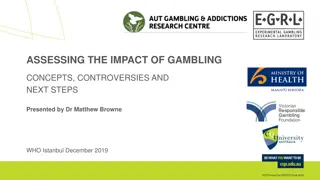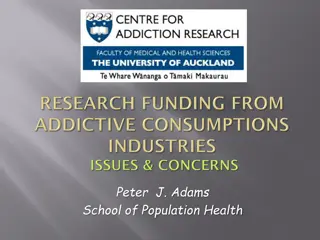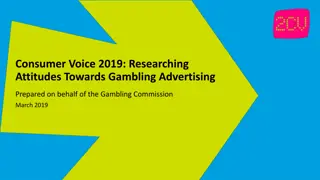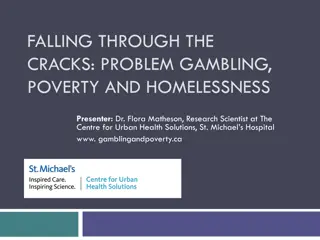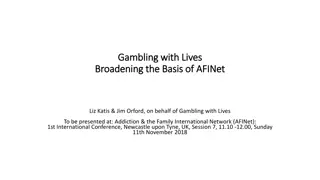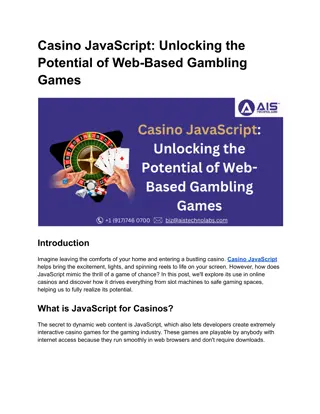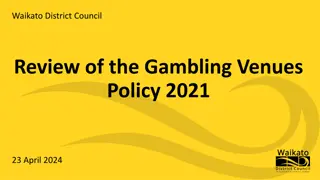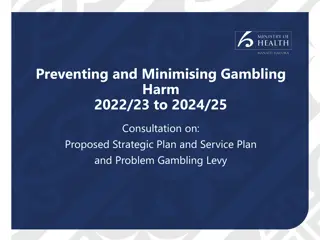Exploring Gambling Consumers' Information Needs in 2019 Research
The Gambling Commission's 2019 research delves into understanding the information provided to gambling consumers. Key findings include the importance of trust indicators, targeting specific groups with enhanced information, and the need for clear, relevant information throughout the gambling journey. This study aims to improve how gambling operators convey information to better meet players' needs.
Download Presentation

Please find below an Image/Link to download the presentation.
The content on the website is provided AS IS for your information and personal use only. It may not be sold, licensed, or shared on other websites without obtaining consent from the author. Download presentation by click this link. If you encounter any issues during the download, it is possible that the publisher has removed the file from their server.
E N D
Presentation Transcript
Exploring the information needs of gambling consumers 2019 research Prepared on behalf of the Gambling Commission - 2019
Background Information In 2019, the Gambling Commission commissioned 2CV to undertake a mixed methodology research project to understand the information provided to gambling consumers throughout their gambling experience. The fieldwork for this research was completed in 2019 The fieldwork for this research was completed in 2019. Since then, there has been various policy changes across a variety of areas. For example, government introduced changes to Fixed Odds Betting Terminal (FOBT) stakes, which took effect from 1 April 2019. The Commission has made updates to the Licence Conditions and Codes of Practice (LCCP) which now prohibits excessive ID requirements for withdrawals or unclear wagering requirements in offers. We also introduced a ban on gambling with credit cards. To enrich the context of the slides where there are speech marks, these are opinions/quotes from participants as part of the qualitative research. The conclusions are those drawn from 2CV. Some of the slides refer to hot/cold states . This links into previous research we have published on our website titled Understanding why people gamble and typologies . The research also included some questions on credit card gambling. Outputs from that research have already been published, alongside the consultation response document, which is available on our website. 2 Research conducted in 2019
Introduction Key Objective: Understand what information is currently provided for gambling consumers to inform their decision making at each stage of their gambling journey and identify areas where this could be improved. Exec Summary Exec Summary Understanding what information players have, how they interact with it and how this drives their views of gambling operators, can help operators ensure they are providing clear and relevant information that players want and need. Points for further consideration Points for further consideration Trust is a key driver for players in operator choice, so opportunity exists for a brands to positively differentiate themselves through trust indicators. Gamblers want brands to be trustworthy but currently this is understood implicitly through the brand and its size rather than any specific indicators. Overall, the group that require the most enhanced or more targeted information when gambling is the Low Gambling Literacy (GLS) group The timing and placement of information/messaging is also important, as is a more relevant targeted action rather than a generic caution message. Most gamblers felt that they could gamble without receiving further information. However, this group were focused upon the information necessary to start gambling, rather than gambling risks or concepts such as return to player (RTP). 3 Research conducted in 2019
Objective of research The Gambling Commission is committed to promoting greater transparency by putting independent and trusted information in the public domain. To do this, it needed to: Understand what information is currently provided for gambling consumers to inform their decision making at each stage of their gambling journey Identify areas where this could be improved. This will lead to a stronger understanding of how gambling operators can ensure they are providing clear and relevant information that players want and need. 4 Research conducted in 2019
A 2 stage approach Quantitative Online survey among 1027 people aged 18+ in Great Britain. All must have taken part in a gambling activity in the last four weeks. Demographic quotas were applied to ensure the sample reflected the national profile of gamblers. Lottery players were capped so that it was possible to robustly evaluate a mix of gambling activities and channels Aim: To explore factors that influence people s choice of gambling company and their gambling journey through satisfaction and awareness of information available in the sector (e.g. what was noticed, when, relevance and ease of understanding) Stage 1 Qualitative 30 people across 4 x Focus groups in London and Birmingham with people aged between 20-65yrs. To explore their experience of information available when gambling and their priorities. Stage 2 5 Research conducted in 2019
The Positive Play Scale (PPS) The Positive Play Scale (PPS) - developed in Canada to measure levels of positive gambling related beliefs and behaviours, offering something different to standard problem gambling measures. Positive Play Scale (PPS) (Wood, Wohl, Tabri & Philander, 2017) Beliefs Beliefs Behaviours Behaviours Honesty and Control Gambling Literacy Pre Personal Responsibility commitment Assesses the extent to which a player considers how much money and time they should spend gambling. Assesses the extent to which a player believes they should take ownership of their own gambling behaviour. Assesses the extent to which a player has an accurate understanding about the nature of gambling. Assesses how honest a player is with others about their gambling and feels in control of their behaviour. Source: National Validation of the Positive Play Scale: Assessing Responsible Gambling Across Canada (Wood, Wohl & Tabri, 2018) 6 Research conducted in 2019
Quantitative Survey: The Gambling Literacy Score We took the opportunity in this research to use the Gambling Literacy Score (GLS)* as an indicator, whether the GLS had an impact on how people needed or used information. The GLS assesses the extent to which a player has an accurate understanding about the nature of gambling. The GLS is determined by an individual s responses to three statements, detailed below. Depending on their responses, survey participants are considered to have a high, medium or low GLS. Further analysis and a breakdown of the responses are in the following slides. How the Gambling Literacy Score is calculated High GLS High GLS = Must score 6/7 (Strongly Agree) that Gambling is not a good way to make money AND score 1 / 2 (Strongly Disagree) at My chances of winning get better after I have lost AND gamble more often it will help me to win more than I lose AND AND that If I Medium GLS Medium GLS = Must score 4-7 (Agree) that Gambling is not a good way to make money AND score 1- 4 (Disagree) at My chances of winning get better after I have lost AND at If I gamble more often it will help me to win more than I lose Low GLS Low GLS = Must score 1-3 (Disagree) that Gambling is not a good way to make money OR score 5-7 (Agree) at My chances of winning get better after I have lost OR at If I gamble more often it will help me to win more than I lose *Part of the Positive Play Scale (PPS) (Wood, Wohl & Tabri, 2018) 7 Research conducted in 2019
QUANT Gambling Literacy Score (GLS) response rate for participants To what extent do you agree or disagree with the following statements? Gambling is not a good way Gambling is not a good way to make money to make money My chances of winning get My chances of winning get better after I have lost better after I have lost If I gamble more often, it will help If I gamble more often, it will help me to win more than I lose me to win more than I lose 3% 3% Strongly agree 5% 6% 9% 9% 29% 6 10% 11% 54% agree (i.e. higher GLS) 5 15% 16% 25% 4 18% 17% 3 20% 58% disagree (i.e. higher GLS) 56% disagree (i.e. higher GLS) 2 10% 40% 39% Strongly disagree 7% 4% 4% Literacy.1.2.3. Below are some things that other people have said about gambling. To what extent do you agree with these? n=1027, Total sample 8 Research conducted in 2019
QUAL The Gambling Literacy Score influenced who was recruited for the qualitative phase of the research Mix of men and women Representation of a range of gambling activities 3:5 split per group to gamble in person the majority of the time vs to gamble online the majority of the time 3-4 per session who recently tried a gambling activity that is completely new to them Session Session 1 2 3 4 Gambling literacy Gambling literacy Low literacy Low literacy Medium literacy High literacy Age Age 20-35 40-60 40-60 20-35 Location Location Mids London/SE Mids London/SE Throughout the deck we refer to these Throughout the deck we refer to these groups on quotes as groups on quotes as LGLS = low gambling literacy score LGLS = low gambling literacy score MGLS = medium gambling literacy score MGLS = medium gambling literacy score HGLS = High gambling literacy score HGLS = High gambling literacy score 9 Research conducted in 2019
Key Findings Research conducted in 2019
Key findings on information provision Most gamblers don t believe they need further information at the point of play, suggesting information provision needs are well met in the mind of the gambler 1 This is because players are focused on obtaining the information they need to have at the point of play in order to play - typically related to the game or the bet, or the account information that will facilitate this: this information is most likely to be recalled from their playing experience 2 Players claim that a trustworthy reputation is central to how they choose a gambling brand. Typically, they judge this based on the size of operator vs. any particular trust cues. But this kind of information is not recalled from play, indicating a possible needs gap 3 Once they ve chosen a brand to play with, a trustworthy reputation becomes something that s more passively understood and accepted. Players only rarely actively seek information about this, unless they encounter a problem 4 There s a tension around trust when it comes to gambling operators because players understand their behaviour is inherently risky. Being trustworthy can be described as a hygiene factor with the benchmark for trust being lower than other industries (e.g. healthcare) and a sense of apathy in expectation that operators might excel in this area 5 11 Research conducted in 2019
Where are the opportunities to improve information provision? The group in biggest need of enhanced or more targeted information when gambling is the Low Gambling Literacy (GLS) group specifically Managing Gambling information e.g. setting deposit limits is considered more important vs. other groups in terms of influencing which brand they gamble with 1 Positively this kind of information is cutting through: they are more likely to recall it from play vs. other groups and find it easy to understand, but there s room to improve. Focusing on specific targeted actions e.g. setting timeouts is more relevant than a generic caution message 2 Furthermore, the timing and placement of these messages is important due to mindset while gambling. Ensuring they create friction in a hot state and cut through while in a cold state is more likely to prompt reflection and positive action. Contextual information around benchmarking their bets and risk management is where a perceived needs gap exists 3 Trust among large operators is currently fairly flat across brands. Trust is a key driver in operator choice, so opportunity exists for a brand to positively differentiate itself through trust indicators 4 Ensuring a speedy payout of winnings as a means of conveying trustworthiness has the strongest potential to influence where players choose to gamble. Players see this as an operator valuing customer experience 5 See slide 2 for some of the improvements and changes made since these recommended opportunities were identified 12 Research conducted in 2019
QUANT There is a strong correlation between Low GLS, and heavy/frequent gambling, as well as with credit card use for gambling Those with a low GLS take part in more activities typically these are more likely to be online betting, betting in person/store and playing games machines. They are less likely to play the lottery. Gambling Literacy by key subgroups Gambling activities taken part in High GLS 1.6 Medium GLS 2 Low GLS 2.4 2.4 Average no. of activities 34% 50% 60% High GLS Medium GLS Low GLS 30% 52% 51% 29% 24% 36% 32% 31% 28% 36% 21% 21% 20% 19% 16% 14% 10% 8% Total Credit Card Gamblers Gamble more than most Lottery or scratchcard Betting online Betting in person Games machines High GLS Medium GLS Low GLS in person Literacy.1.2.3. Below are some things that other people have said about gambling. To what extent do you agree with these? n=1027 Total Sample 13 Research conducted in 2019
Information gamblers want, when choosing where to gamble Research conducted in 2019
QUAL There is little differentiation in what influences players to choose a particular operator For the majority the original For the majority the original operator choice is driven by: operator choice is driven by: In the moment play benefit In the moment play benefit i.e. best odds, sign up bonus Proximity - it s the store closest to me, it s the app on my phone It s the one my dad/friend uses Most stick to a preferred company Most stick to a preferred company Lack of self-trust in having multiple providers, could lead to gambling more than they would like to Familiarity with usability Familiarity with usability drives ease of play Low desire to switch operator Only a minority actively Only a minority actively entertained a repertoire of entertained a repertoire of operators operators This was driven by chasing the best odds and deals the best odds and deals chasing Some will have better odds but it s almost like having a bank account, I can t be bothered to change. There are probably better ones, but it would do me wrong to have multiple accounts; I wouldn t trust myself LGLS Bham I have two different operator accounts as they will give you the best odds LGLS Bham 15 15 Research conducted in 2019
QUANT For the quantitative phase, information was sorted into four groups This helped us analyse each aspect of the gambling journey, but also as part of a step in the journey. MANAGING GAMBLING Information about options to manage/control how they gamble GAMEPLAY TRANSPARENCY ACCOUNT INFO Information about their account Information about the brand/company they gamble with Information about what they gamble on How to set deposit limits How to set reality checks Getting help to control gambling or spotting a problem How to set time- outs How to exclude yourself Reputation for being trustworthy Confirmation of GC licence How protected any funds you deposit are How money is used for good causes Action taken against the company How to make a complaint How to withdraw money Information about the state of your account Free bets and bonus offers Terms of use for account ID verification requirements Odds of winning Prize available Price/minimum stake Game rules Terms & conditions 16 Research conducted in 2019
QUANT What are the most important factors when choosing where to gamble? Trustworthy reputation is #1 most important factor, but Gameplay is the most important grouping, with odds #2 and prize #3 Reputation for being trustworthy AVERAGE IMPORTANCE 61% 41% 35% 76% 69% 62% 57% 56% 48% Confirmation of GC license 38% 31% How protected any funds you deposit are 29% 33% TRANSPARENCY How money is used for good causes 27% 30% Action taken against the company 28% 28% How to make a complaint 19% 29% 73% 71% 69% 62% 54% Odds of winning 37% 36% 66% Prize available 33% 38% GAME PLAY Price / minimum stake 30% 39% Game rules 25% 37% Terms & conditions 22% 32% How to withdraw money 41% 31% 72% 67% 61% 55% 52% 61% Information about the state of your account 33% 34% ACCOUNT INFO Free bets and bonus offers 27% 34% Terms of use for account 21% 34% ID verification requirements 21% 31% How to set deposit limits 24% 28% 52% 48% 46% 44% 44% 47% How to set reality checks 20% 28% MANAGING GAMBLING Getting help to control gambling or spotting a 22% 24% How to exclude yourself 20% 24% How to set time-outs 19% Very important 25% Important 17 Research conducted in 2019 A2. When gambling, how important are each of the following to you when it comes to choosing which brand to place a bet / play with? N=1027 Total Sample
QUAL There is a balancing act when deciding whether to gamble with big or small operators Participants perceptions between big named verses smaller operators Big named operator Big named operator Smaller (often online) operator Smaller (often online) operator Confidence in ability and willingness to pay- out winnings A desire to keep customers loyal Greater levels of trust in online games More heavily scrutinised by gambling regulators Less confidence in how deals are structured conditions likely to be tougher, making it harder to cash out on winnings. Less confidence in trust of online casino style games, heavily weighted against the player Likely to offer the best odds to attract new customers Can t compete on reputation so need to compete Can t compete on reputation so need to compete on deals and odds that attract people to take a on deals and odds that attract people to take a risk on an unknown risk on an unknown Ultimately have to act conscientiously to maintain Ultimately have to act conscientiously to maintain their reputation in a highly competitive space their reputation in a highly competitive space 18 18 Research conducted in 2019
Information players notice when gambling Research conducted in 2019
QUAL In the moment , game play and account information is looked for at every stage of a typical gambling journey GAMEPLAY TRANSPARENCY MANAGING GAMBLING ACCOUNT INFO Entering the gambling space Deciding upon a bet/ gamble Making the bet/ starting to play Leaving the location/ store/site The The Playing again prompt to play outcome SOUGHGT OUT OUT INFORMATION INFORMATION T&Cs Best odds Jackpot Odds Odds, Form, tips and context Previous successes What others around you are spending Other chances to play Odds, Previous bets, Form Time/ money spent (minority) Account balance Offers, Available funds SOUGHGT Available funds How much you are up/down Free spins /offers Free spins Offers Available funds Safe play interaction (minority) 20 Research conducted in 2019
QUAL Examples of information is available across a typical gambling journey as at 2019. Entering the gambling space Deciding upon a bet/ gamble Making the bet/ starting to play Leaving the location/ store/site The The Playing again decision to gamble outcome I have emails saying we haven t seen you for a while, do you want to have a bet. Here s a 5 bet. It s pretty cynical but they probably will hook me back LGLS Bham I ll go into the bookies and the staff will let me know what offers they ve got on that day MGLS Bham I look at form and stuff like that and try and put a bet together its 5- 10 and it s not overly involved but I m trying to get the best return LGLS Bham You keep an eye on your phone, you know that they are always conceding but they come back and win HGLS London Sometimes you are chasing aren t you and if it hasn t come in you think right well I can get it back if I go for the longer odds. LGLS Bham If you are in the chasing mindset, then you don t give a toss you want to be net, the account in zero it doesn t matter what they say to you LGLS Bham My mate gets a thing when he's been playing the slots saying his profit and loss. I've put my bet on and logged off I m not getting anything from them. LGLS Bham 21
QUANT Information types recalled from a recent gambling experience (average across various activities) What is recalled from a recent gambling experience is very much focused on play, followed by managing their account. ACCOUNT ACCOUNT INFO INFO 32% 32% group average MANAGING MANAGING GAMBLING GAMBLING 20% 20% group average TRANSPARENCY TRANSPARENCY GAME PLAY GAME PLAY 42% 42% group average 17% 17% group average 51% 51% 39% 38% 36% 35% 34% 32% 28% Average recall = 27% 27% 26% 26% 24% 20% 19% 17% 17% 17% 16% 13% 9% 22 Research conducted in 2019 B4a/b. Still thinking about the last time you XX XX do you remember seeing? N=1027 Total Sample
QUANT Players claim Transparency is central to brand choice, but they don t see this information when playing, indicating a potential needs gap We calculated a needs gap by identifying whether players notice what they say is important Calculation Calculation Largest 10 information gaps between what players say is important & information recalled when gambling - -24% 24% group average gap GAME PLAY GAME PLAY - -29% 29% group average ACCOUNT ACCOUNT INFO INFO -31% -32% -35% -35% -37% -56% -48% -45% -43% -42% - -26% 26% group average MANAGING MANAGING GAMBLING GAMBLING Calculation Calculation Smallest 10 Gaps - -44% 44% group average TRANSPARENCY TRANSPARENCY TRANSPARENCY TRANSPARENCY -18% -20% -20% -22% -22% -24% -25% -26% -26% -27% 23 A2. When gambling, how important are each of the following to you when it comes to choosing which brand to place a bet / play with? B4a/b. Still thinking about the last time you XX XX do you remember seeing? N=1027 Total Sample
QUAL QUANT Yet 88% state they did not need further info during a recent gambling experience information needs appear well met While more information is accessed if playing for the first time, it is still viewed based on a needs basis I know there is responsible gambling one where you have to press some buttons and put your DOB MGLS Bham 88% When you set your account up, it lets you set your spend limit, so you do that and don t look at it again MGLS Bham Only a minority set gambling parameters on opening an account Acknowledgement to skim reading the rules/instructions Only a low level anxiety exists around getting it right and following social norms for a situation i.e acceptable spend when betting in person state they did not need further information* during a recent gambling experience, however this was lower for those with low GLS scores (see slide 35 for detail) *Some participants who did say that they need further information wanted more options to play or win (see slide 42 for further detail) B11. Still thinking about <<DACTIVITYTEXT>>, is there any other information that you have needed in the past, but not found? N=1027 Total Sample, n=363 High GLS, n=314 Med GLS, n=350 Low GLS. Lottery in person n=213 online n=130, Bingo in person n=116, online n=160, Betting in person n=178, online n=422, Gaming machine in person n=80, online n=162 24 Research conducted in 2019
QUAL QUANT Players are aware of lots of information but only notice what they need to enable them to play Relates directly to those pieces of information that engage you or relate directly to enabling gameplay Information players are aware of but only exists on their periphery. They don t actively use this information during the majority of their play INFORMATION USED For me it is working out the form, the weight, who they are up against, so it is not so much of a gamble HGLS Bham It s nice to know that the support is there, it should be there for people that need it. You wouldn t want to have to read it every time you log on LGLS Bham ACTIVE ASSIMILATION PASSIVE ASSIMILATION i.e. i.e. i.e. i.e. ACCOUNT INFO MANAGING GAMBLING TRANSPARENCY TRANSPARENCY TRANSPARENCY GAME PLAY The exception is when people try The exception is when people try something for the first time or something for the first time or when they experience a problem when they experience a problem 25 Research conducted in 2019
Why do consumers say trust important? Research conducted in 2019
QUANT Many gamblers don t see the types of information they claim is important when they are gambling. But, this rarely translates into feeling they lack information Yet only 12% felt they needed additional information after gambling mostly, information needs are met But an average of only 20% see information indicating the brand is trustworthy large apparent need gaps 76% of gamblers claim it s important for the gambling brands they use to be trustworthy There is a gap to be plugged, but most gamblers don t know or acknowledge this exists. The industry has an opportunity to address an unmet need of demonstrating trustworthiness, visibly communicating their commitment to transparency and trustworthiness to customers 27 Research conducted in 2019
QUAL Exploring how trust is built helps us to pinpoint how players perceive the trustworthiness of operators CONTEXT SOCIAL TRUST COGNITIVE TRUST C How easily trust is given, gained and How easily trust is given, gained and lost depends on context. lost depends on context. Trust relies on a social assessment of Trust relies on a social assessment of intention: do you intend to do me intention: do you intend to do me well? well? Then, it s down to delivery: can you do Then, it s down to delivery: can you do what you said you would do for me? what you said you would do for me? Sensitivity is much higher in some Sensitivity is much higher in some situations and for some people situations and for some people Cognitive trust is earnt if a service is Cognitive trust is earnt if a service is perceived as effective perceived as effective Social trust is earnt when a provider is Social trust is earnt when a provider is seen as reputable seen as reputable Adapted from Lewis, J. D.; Weigert, A. 1985. Trust as a social reality, Social Forces 63(4): 967 985. 28 Research conducted in 2019
QUAL The gambling industry operates within a context where people taking calculated risks is inherent This is an industry defined by gameplay and fun . Gambling is This is an industry defined by gameplay and fun . Gambling is inherently risky, with instances of extreme play which means that the inherently risky, with instances of extreme play which means that the benchmark for a virtuous type of trust is lower and can feels at odds benchmark for a virtuous type of trust is lower and can feels at odds with making a gamble . with making a gamble . You know what you are doing and you know that it is naughty, You know the rules are there but you just want to ignore them, you want to enjoy yourself LGLS Bham CONTEXT CONTEXT In the view of some respondents, players have responsibility for the In the view of some respondents, players have responsibility for the choices that they make and their ability to control their behaviour. choices that they make and their ability to control their behaviour. Many respondents felt responsible for gambling excesses, despite the Many respondents felt responsible for gambling excesses, despite the regulatory requirement that operators take action to identify and regulatory requirement that operators take action to identify and support customers at risk of gambling support customers at risk of gambling- -related harms. Recent press has not yet reached a tipping point where players actively Recent press has not yet reached a tipping point where players actively differentiate risk across various operators which might therefore differentiate risk across various operators which might therefore challenge their sense of trust challenge their sense of trust BUT there is a sense that this could change as press attention around FOB-T restrictions (introduced in April 2019) and operator fines start to differentiate behaviours of specific brands related harms. How easily trust is given, gained and How easily trust is given, gained and lost depends on context. lost depends on context. Sensitivity is much higher in some Sensitivity is much higher in some situations and for some people situations and for some people 29 Research conducted in 2019
QUAL Earning social trust is about gaining reputability, but players are aware that gambling operators don t profit on doing them well Gambling firms are recognised as commercial businesses and players Gambling firms are recognised as commercial businesses and players expect operators to want to make profit at their expense expect operators to want to make profit at their expense Nice guys don t run gambling companies, they are strictly in it for the profit HGLS London SOCIAL SOCIAL TRUST TRUST The exception is National Lottery which through its charitable work is The exception is National Lottery which through its charitable work is deemed to have more of a social conscience than other operators deemed to have more of a social conscience than other operators Trust relies heavily on reputability which is currently earned once you Trust relies heavily on reputability which is currently earned once you become a bigger operator. In contrast, there is some concern around become a bigger operator. In contrast, there is some concern around the reputability of smaller less familiar online operators the reputability of smaller less familiar online operators While players do not expect gambling operators to do right by them, While players do not expect gambling operators to do right by them, social trust is eroded if operators are seen to do them wrong social trust is eroded if operators are seen to do them wrong Trust relies on a social assessment of Trust relies on a social assessment of intention: do you intend to do me intention: do you intend to do me well? well? Social trust becomes more relevant when players suffer an issue or need Social trust becomes more relevant when players suffer an issue or need to make a complaint and frequent challenges will damage reputation to make a complaint and frequent challenges will damage reputation I tried to get in contact with them and realised they don t even have a phone number, just an online anonymous form LGLS London Social trust is earnt when a provider is Social trust is earnt when a provider is seen as reputable seen as reputable 30 Research conducted in 2019
QUAL Gambling operators tend to perform well on cognitive trust as long as pay out of winnings is smooth and gameplay is frictionless Players perceive that gambling operators are committed to delivering Players perceive that gambling operators are committed to delivering a good playing experience in order to keep you coming back as a a good playing experience in order to keep you coming back as a customer and to keep you playing customer and to keep you playing COGNITIVE COGNITIVE TRUST TRUST You don t tend to see any distractions when you are playing or placing a bet because they don t want you to stop playing HGLS London Pay out of winnings is the biggest sticking point when it comes to Pay out of winnings is the biggest sticking point when it comes to earning cognitive trust as an operator earning cognitive trust as an operator This is the area where some operators can inspire mistrust if they This is the area where some operators can inspire mistrust if they don t follow through don t follow through Now, because fruit machines are digital the maximum payout is set at 200. I don t play them anymore as you don t have a chance in hell of winning MGLS Bham Then, it s down to delivery: can you do Then, it s down to delivery: can you do what you said you would do for me? what you said you would do for me? The bookie didn t pay out to me because I hadn t given my ID which really annoyed me they let me place a bet without ID but suddenly it became an issue when I won! LGLS London Cognitive trust is earnt if a service is Cognitive trust is earnt if a service is perceived as effective perceived as effective 31 Research conducted in 2019
QUAL Trust is currently important when choosing an operator but easily satisfied due to lack of differentiation CONTEXT CONTEXT SOCIAL SOCIAL TRUST TRUST COGNITIVE COGNITIVE TRUST TRUST The wider context means that players currently don t expect to have to think don t expect to have to think too much about the trustworthiness too much about the trustworthiness of their operators. The industry focuses on communicating fun and winning big , which creates an apathy around the benchmarking of trust across operators. Players are aware that gambling companies don t profit by doing them well and don t expect it. Reputability is therefore given to operators by default therefore given to operators by default based on the size of the company. based on the size of the company. Apart from the National Lottery, no operator has earned social trust that is based on doing well by customers. . Social mistrust occurs when operators can be seen to be doing badly by their customers. This is when players experience an issue. Frequent issues will impact reputation Most operators have gained cognitive trust from players by offering a good customer experience with frictionless play. Reputability is The area where cognitive trust is most cognitive trust is most frequently lost is when pay out of frequently lost is when pay out of winnings are challenged. winnings are challenged. This challenges the operators commitment to customer care. When choosing an operator Trust is When choosing an operator Trust is important but once established, important but once established, gameplay information takes over gameplay information takes over everyday everyday play needs play needs In a market place defined by a lack of real differentiation on trust, the operator that defines itself on reputation and In a market place defined by a lack of real differentiation on trust, the operator that defines itself on reputation and trustworthiness could find a motivating point of distinction trustworthiness could find a motivating point of distinction 32 Research conducted in 2019
QUAL Regulators are currently playing a key role in filling the trust gap left open by operators but there s a desire to see more Increasing focus in the press on acceptable risk through the discussion of advertising bans, bans on credit card gambling and FOB-T limits has illustrated regulators taking a harder stance on operators. In the view of some respondents: Regulators define the extent to which operators can push the boundaries of acceptable risk There is an expectation that licensees prioritise commercial considerations in a sector defined by risk taking While there is a clear value in tackling problematic While there is a clear value in tackling problematic play, operator communications can cast them as play, operator communications can cast them as victim of these legislation changes victim of these legislation changes FOB FOB- -T changes have significantly decreased T changes have significantly decreased operator profitability and they have had to operator profitability and they have had to close high street stores close high street stores Without attention cast back onto operators, the Without attention cast back onto operators, the responsibility is firmly focused on the regulator who responsibility is firmly focused on the regulator who is currently seen as being able to do more to is currently seen as being able to do more to prevent problem gambling (i.e. betting on multiple prevent problem gambling (i.e. betting on multiple sites, accepting bets from people chasing losses) sites, accepting bets from people chasing losses) It needs to be the Gambling Commission that do it because they are the ones that need to believe it. It s all a bit half hearted at the moment, if they really wanted you to do more you could. It s now just so easy to have a bet LGLS Bham The legislation is coming now with the Government, you have had the limited spend amounts on the machines. I think bookies can't afford to keep open on the High Street now. MGLS Bham 33 Research conducted in 2019
What type of gamblers need more support? Research conducted in 2019
QUANT Low gambling literacy players recognise a greater need for information provision, particularly given their heavier play Low GLS players require more information than others Low GLS players require more information than others exacerbated by their higher frequency of play exacerbated by their higher frequency of play % stating they did not need further information % stating they did not need further information by audience audience by Frequency of play by gambling literacy group Frequency of play by gambling literacy group High GLS Medium GLS Low GLS 96% 94% 88% 23% 23% 28% 28% 34% 34% 76% 60% 60% 25% 25% 30% 30% 42% 42% 24% 24% 52% 52% 36% 36% 30% 30% 16% 16% Total Don't gamble / gamble less than most Gamble a normal amount Gamble more than most Total High GLS Medium GLS Low GLS B11. Still thinking about <<DACTIVITYTEXT>>, is there any other information that you have needed in the past, but not found? N=1027 Total Sample, n=363 High GLS, n=314 Med GLS, n=350 Low GLS. Lottery in person n=213 online n=130, Bingo in person n=116, online n=160, Betting in person n=178, online n=422, Gaming machine in person n=80, online n=162 35 Research conducted in 2019
QUANT The information they are more likely to find important vs. other players is around gambling management (alongside free bets) Important to Low GLS gamblers Important to all ACCOUNT INFO MANAGING GAMBLING MANAGING GAMBLING MANAGING GAMBLING MANAGING GAMBLING MANAGING GAMBLING Odds of winning TRANSPARENCY High GLS (a) Medium GLS (b) Low GLS (c) Reputation of the company for being trustworthy 67% 65% 59% 55% 53% 53% 52% 51% 50% 49% 49% 48% 45% 45% 45% 44% 44% 44% 41% 40% 37% How to withdraw money Price / minimum stake Free bets and bonus offers How to set deposit limits How to set reality checks Getting help to control gambling How to make a complaint How to set time- outs How to exclude yourself from certain activities Prize available 36 Research conducted in 2019 A2. When gambling, how important are each of the following to you when it comes to choosing which brand to place a bet / play with? N=1027 Total Sample
QUANT Positively, recall of information linked to Managing Gambling & Transparency is better for Low GLS gamblers, & they find it easy to understand % stating they recall seeing each last time they gambled % stating they recall seeing each last time they gambled % stating information was easy to understand % stating information was easy to understand Total Low GLS Total Low GLS 92% 91% 87% 86% 85% 84% 84% 84% +1pt +3pts +8pts +8pts 43% 42% +7pts +7pts 35% 32% 28% 24% 20% 17% Gameplay Account info Managing Gambling Transparency Gameplay Transparency Account info Managing Gambling A2. B4A. Still thinking about the last time you <<DACTIVITYTEXT>>, which if any, of the following pieces of information do you remember seeing? B8. How easy or difficult was this information to understand? Base: All respondents (1027), Low GLS respondents (350) 37 Research conducted in 2019
QUAL Gambling management info shows commitment to customer care, but there can be a tension with how operators maintain custom The presence of gambling management information and tools is expected in order to is expected in order to be seen as a reputable be seen as a reputable gambling operator gambling operator However due to the perceived highly competitive space players expect customer care to also be provided in other formats Highly competitive odds Bonuses and free bets Rewards and recognition for loyal custom They have to be relatively reputable because there are so many others that will take your business MGLS Bham VS Looking after your customer Looking out for your customer At a glance, its presence illustrates that the operator cares about the consumer and the pursuit of balanced play However upon further consideration players reflect that they are also present because operators are legislated to do so Online they are trying to look after their customer aren t they. If I go online now I could easily open accounts with 20 different people. They have to give you stuff to buy your loyalty, it s too competitive otherwise so they have to look out for you a bit LGLS Bham These messages can conflict, and are likely to hurt low GLS gamblers the most, as they play most frequently and are most likely to find free bets important as they seek out opportunities to play 38
What information is needed and how? Research conducted in 2019
QUAL There s an opportunity to improve relevance and timing of existing messaging to create a greater positive behaviour change RELEVANCY | Most prominent messages don t feel relevant enough TIMING | messages often delivered when players are less open to them However prominent Gamble Aware and When the Fun Stops, Stop branding are often seen as lacking personal relevance It does come up with gamblers aware but I don t pay attention to it because I don t feel I need to MGLS Bham Some limited experience of interactions in this space can add greater friction during play and can interrupt the hot state However those who experienced them often refer to closing them and continuing play with little friction caused It is often only when closing the gambling space that players report seeing duration and spend volume information provided and again this is a minority and many click away before reading 40 Research conducted in 2019
QUANT For Low GLS gamblers in particular, information to help manage gambling needs to be focused on specifics While the getting help to control message has higher recall, the relevance of this message is lower than the more targeted actions e.g. self exclusion and setting limits. (CONTROL = Getting help to control gambling / spotting you have a problem) Low GLS Group Only % recalled seeing information type % recalled seeing information type How relevant are these measures when seen? How relevant are these measures when seen? 83% Top 2 Box SET LIMITS SET LIMITS 32% SET LIMITS SET LIMITS 40% 43% 67% T2B 67% T2B CONTROL CONTROL 29% 38% CONTROL CONTROL 31% SET SET 76% T2B 33% 43% SET TIMEOUTS SET TIMEOUTS 27% TIMEOUTS TIMEOUTS REALITY REALITY CHECKS CHECKS 31% 48% 79% T2B REALITY CHECKS REALITY CHECKS 25% SELF- SELF- EXCLUDE EXCLUDE 40% 44% 84% T2B SELF-EXCLUDE SELF-EXCLUDE 25% Very relevant Quite relevant B7. How relevant Base: n=350 Low GLS. relevant was this information to you? 41 Research conducted in 2019
QUANT An opportunity area is providing greater contextual information covering positive play benchmarking as well as risk reminders This context could be in terms of their past behaviour and past wins, their behaviour compared to other gamblers linked to the likelihood of winning. Chasing a win or an opportunity to play is the likely driver of the information, though how to stop also important OPEN Answers among those who said they did need more info What information would you have liked? More options to play/win Benchmarking their gambling Cataloguing wins / stats Risk reminders / how to stop Gaming can be mental illness, so need to be warning of RISK. Gaming is entertainment that we play, with option to sometime win something What a healthy and normal amount of gambling is More ways of winning Past history of bets How many bingos are available and what percentage of people will be able to win a bingo More rewards Previous scores and results Bonuses or rewards for playing regularly I wanted to see how one can deactivate his or her account when he or she decides to stop gambling Statistics Chances of winning How to set limits 42 Research conducted in 2019 B12. Still thinking about <<DACTIVITYTEXT>>, what information would you have liked to have? N=178 responses within loops
QUAL But when these messages are seen is crucial: if they land during a cold state it s more likely to result in a lasting behaviour change Gambling behaviour comes as a result of shifting from a cold state cold state of consideration into a hot state gamble responsibly is always on, but behaviour fluctuates driven by the hot state. hot state of play. The intention to Hot State Hot State Play Play Cold State Cold State Consideration Consideration This is the point when messages are most likely to be seen but due to the hot state it s the point when people are least likely to be receptive due to the friction that they create friction that they create I was getting the messages up and I was just clicking away because I wanted to win MGLS Bham Players highlight accessing spend limits to increase rather than decrease accessing spend limits to increase rather than decrease them You can shift your limit every 24 hours I know that from experience. You lose so you raise your limit and in 24 hours you are limitless again. They don t say are you sure, why don t we give you a week to cool off, always 24 hours later you are there and your limits are going up and up and up. LGLS Bham Cold state consideration can however prompt reflection on play and motivate more detailed exploration of player statistics for a small minority In between January and October, I had spent 4000 it was there and it tells you. I couldn t believe it, I knew I had to stop MGLS Bham Reaching people with relevant information during the cold state is more likely to result in lasting change least likely to be receptive due to the 43 Research conducted in 2019
